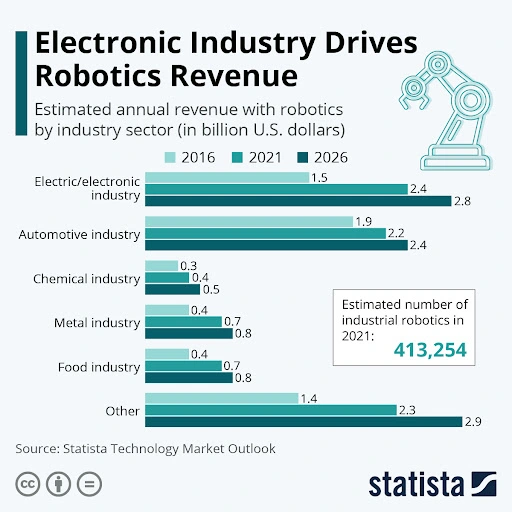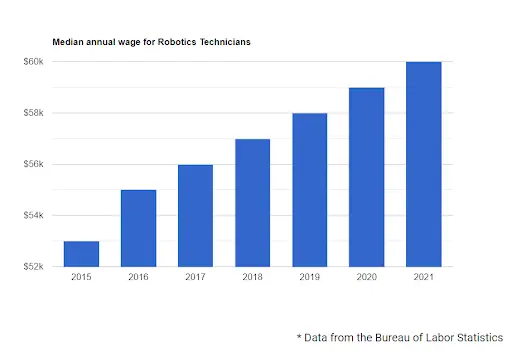Moonpreneur
Update: This article was last updated on 16th January 2026 to reflect the accuracy and up-to-date information on the page.
Robotics in various industries have seen an exponential boom. The revenue of the global industrial robotics market was estimated at $9.31 billion in 2024 and is expected to climb up to a staggering $81.4 billion by 2028. These statistics have made Robotics a buzzword in the job market, and many individuals are curious about whether a career in robotics is a good choice.
In this blog, we will explore the prospects of robotics as a career choice and the opportunities and challenges associated with it.
What is Robotics and how fast is it transforming industries?
Let’s start with the basics.
Robotics is the study of designing, developing, and operating robots. A robot is a machine that can perform tasks autonomously or with minimal human intervention. Robots are widely used in various industries, including manufacturing, healthcare, agriculture, and transportation.
What are the prospects of Robotics as a Career Choice?
The prospects are promising because the field of robotics is expanding rapidly, and the demand for skilled professionals is increasing. According to the Bureau of Labor Statistics, employment in the robotics industry is expected to grow by 11% between 2016 and 2026, which is faster than the average for all occupations.
The growth of the robotics industry is driven by the increasing demand for automation in various industries. The use of robotics in manufacturing has led to increased efficiency, reduced costs, and improved quality.
Robotics is also widely used in healthcare, where robots are used for surgery, rehabilitation, and patient care. The agriculture industry has also started using robotics for crop monitoring, harvesting, and other tasks.
Opportunities in the Robotics Industry
1. Robotics Engineer
Robotics engineers design, develop, and test robots, including those tailored for robotics programs for kids. They are responsible for creating the software and hardware required for robots to perform tasks autonomously. The U.S. Bureau of Labor Statistics (BLS) had predicted that the country will witness a rise of 9% in demand for Robotics engineers between 2016 and 2026 with the creation of over 25,300 jobs across various industries.
To make things sweeter, Indeed revealed the average salary of a robotics engineer and it is a whopping $100,000 a year!
2. Robotics Technician
Robotics technicians install, maintain, and repair robots. They also diagnose and fix any issues that may arise in the operation of robots. As per the 2021 reports median annual wage for ‘Robotics Technicians’ was $60,360, or $29.02 hourly, which is approximately 31.9% times higher than the national median wage, which is $45,760!!
3. Mechanical Engineer
Mechanical engineering has undergone rapid expansion, particularly in automation and robotics. In areas like manufacturing, tool design, welding, and high-temperature environments, mechanical engineers innovate by developing new robotic systems.
Their roles vary from setting up and managing robotic systems in businesses to researching optimal robotics design and operation. Typically, a graduate degree is necessary to advance in this field. According to data from the Bureau of Labor Statistics (BLS), the average annual salary for mechanical engineers stands at approximately $90,160.
4. Robotics Sales Engineer
Sales engineers play a vital role in the commercialization of robotic technologies. They interact with prospective customers, elucidating the functionalities of mechanical and robotic systems. Furthermore, sales engineers consult with clients to understand their specific requirements, thereby influencing design and manufacturing processes.
Success in this field requires not only a strong technical background but also exceptional communication skills. On average, sales engineers in the United States earn $108,830 annually.
5. Software Developer
Software developers are among the highest-paid professionals in robotics. Their primary responsibility involves developing and enhancing software, including assembly-level languages, necessary for operating robotic systems.
Software engineers conduct thorough testing to ensure that robots meet specified capabilities. They also stay updated with the latest advancements to enhance robotic systems with modern software.
According to data, computer science graduates employed as software developers, quality assurance analysts, and testers earn an average annual salary of $110,140.
Challenges in the Robotics Industry
If one is considering making a career in the Robotics Industry, then it is wise to weigh the challenges this industry is prone to. From an employee point of view, there are two major challenges which need to be addressed!!
1. Cost
One of the biggest challenges this industry faces is the high development and operational cost of robots which is close to an average amount of $10,000 annually! The additional cost of hardware, software, and research and development can become prohibitive for many companies and individuals.
2. Safety
As robots become more advanced and capable, the issue of safety becomes increasingly important. It is crucial to ensure that robots are designed and programmed to minimize the risk of harm to humans who are overseeing or operating them in factories or heavy industries.
Skills Required for a Career in Robotics
A career in robotics requires a combination of four technical and several soft skills; a combination of these helps a person build a fruitful and successful career in the field of robotics.
1. Programming
Robotics engineers and technicians are expert programmers who have a strong understanding of programming languages such as Python, C++, and Java. Also, working knowledge of Computer-Aided Design (CAD) is extremely helpful.
2. Electronics
One is required to have a good understanding of electronics and be able to troubleshoot and repair electronic components. Other than that, soldering is also an important skill that a person should have if they are aspiring to work in the field of robotics.
3. Mechanical Engineering
Robotics engineers should have a good understanding of mechanical engineering principles and be able to design and build robotic components.
4. Artificial Intelligence
Robotics engineers should have a good understanding of artificial intelligence and machine learning algorithms that are used to control robots. The smooth integration of AI and robotics is now slowly becoming a reality in this field.
In addition to the above-mentioned technical skills, soft skills such as critical problem-solving, communication, and teamwork are also important for building a successful career in robotics. Robotics engineers and technicians should be able to work effectively in a team and communicate technical information clearly to non-technical stakeholders.
To sum up, the prospects of robotics as a career choice are very promising. The demand for skilled professionals in the robotics industry is increasing, and profound knowledge of industry-specific robotics skills may help you make a prosperous career in the field of robotics!!
In order to help your little genius gain these skills from a young age
Looking for a comprehensive parenting guide to ensure you are on the right track? Explore a wealth of parenting wisdom and educational insights in Moonpreneur’s blogs. Additionally, you can join our programs that nurture the next generation of innovators. Book a free trial now!




























All around me is controlled by cash. Can I purchase bots that build wealth?
Yes, provided that you are the local hackathon’s Elon Musk. However, most robotics positions involve gradual ascents rather than massive pay increases. Imagine engineering companies, research labs, and maybe robot butlers in the future. Not yacht-worthy, but good enough for a haul.